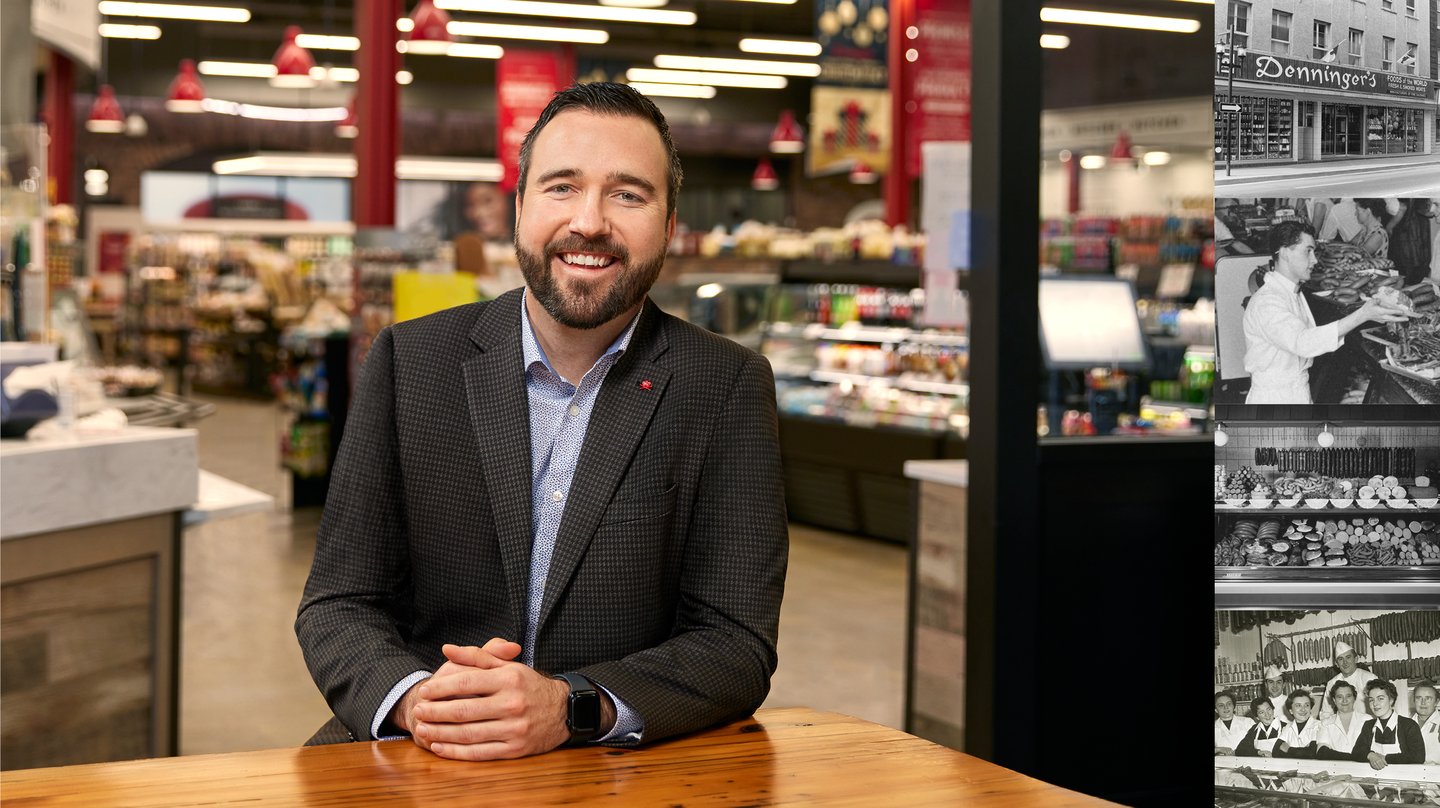Denninger’s new CEO on what’s ahead for the 70-year-old business
It’s early morning in February and inside Denninger’s Burlington, Ont., location there’s a flurry of activity. The specialty grocery store with strong European vibes, a nod to its German roots, has just opened for the day and staff is tending to displays of cheese and indulgent baked goods and filling the expansive meat cases. In the Bitehaus Bistro, prep is well underway as the store gets set for breakfast and lunch customers. As I walk through the store with Patrick Denninger, an employee stops to congratulate him, he smiles widely and thanks the employee. Denninger is still getting the hang of being the big boss; just days earlier (on Feb. 1) he officially became CEO of the 70-year-old company that bears his family name. He succeeds Mary Aduckiewicz, who retired after eight years at the helm. The succession plan, he explains, was in the works for about a year.
While new to the top role, Denninger is no newbie to the business. At just 34, the third-generation grocer has amassed two decades of on-the-job experience, starting out as many grocers do, with an afterschool gig as a teenager. He laughs as he recalls a recent staff party where “legacy” employees were honoured, “this time, my name got populated on the list.” Noting his 20 years with Denninger’s, he says, “I very much grew up in the business, worked all levels/positions and learned various operations.”
But it was working in the company’s purchasing department, earlier in his career, that got him hooked on the business. “I was able to travel to Germany and international food shows and meet international food suppliers,” says Denninger, “and the networking and relationship-building side of the business, with vendors, really gave me a lot of inspiration early in my career.”
READ: Contemplating a succession? Here are five points to consider
Today, the Hamilton-based business the new CEO presides over employs some 280 staff members across five stores (three in Hamilton, one in Burlington and another in Oakville) as well as a 60,000-sq.-ft. manufacturing plant in Hamilton, where the store’s signature foods are made. “We still call [the plant] our best-kept secret; however, the irony is we want people to know that we have our manufacturing plant and that we’re producing all of our products fresh.” The plant is divided into two sections – the sausage kitchen and the gourmet kitchen where 30-plus varieties of soup as well as prepared items such as cabbage rolls, lasagna, stroganoff and a variety of salads are made. “I don’t know, truly, of any other retailers or manufacturers that do the small-batch, European-style processing that we still do,” he says, adding that products are made each day and shipped out to the stores each afternoon. “Everything in our counters is extremely fresh, which is quite unique in the deli world.”
The meat of the matter
In a world that, in recent years, seems dominated by all-things plant-based, Denninger’s firmly leans into meat. Indeed, stroll the aisles of any Denninger’s store and meat figures prominently – from a wide array of fresh sausages to fresh schnitzels (pork and chicken), premium beef and pork cuts at the butcher counter to an expansive selection of Denninger’s-branded smoked and cured meats in the deli. At the Burlington location, a permanent sampling station situated near the butcher and deli counters allows customers to get a taste of the specialty sausages and other meats.
Denninger’s has longstanding expertise in meat. The Denninger family established the business at 283 King Street in Hamilton in 1954, soon after landing in Canada from Germany. In the old country, Rudolf and Frieda Denninger (Patrick’s grandparents) had operated three butcher shops in the Black Forest region and when they set off for Canada, some of their equipment accompanied them on the journey. “It gave them an upper hand, especially at those times, to have some of the sausage-making equipment, which really wasn’t known in Canada,” says Denninger. “It gave them a little bit of a competitive edge in the early days.” Herman Denninger (Patrick’s father, who passed away five years ago) served as the company’s head butcher and sausage maker for decades, developing many of the store’s “core” recipes. “He went back to Germany to study and brought back lots of traditional recipes,” says Denninger. Today, sausages remain the store’s most popular items.
READ: How retailers and producers can boost meat sales
Denninger acknowledges that today’s consumers are eating less meat, but that reality is not deterring the company from continuing to “lead” with it. “It’s almost easier for us to lean-in to meat, because people [when they do eat it] want quality, and that’s what we’ve always stood by,” he explains, noting that Denninger’s sources all its chicken and pork in Ontario and 95% of its beef, and he’s personally visited many of the farms they source from and they share the grocer’s values. “[Consumers] may be eating a smaller portion of steak, but they still want a high-quality steak and that’s where they’re going to come to us.”
Pushing innovation
While meat is front-and-centre, Denninger’s is also focused on cheese, bakery and a curated selection of specialties (jams, confectionery, teas, crackers and scores of other pantry items) that shoppers won’t find anywhere else. But, the grocer also sees a growing opportunity in prepared meals and plans to continue its focus on this category.
“We launched what we’re calling Meals in Minutes,” says Denninger, adding that the lineup includes items such as butter chicken and Thai curry, but the meals that have really taken off are European favourites, including beef stroganoff (“by far the bestseller”). “For us, it really is the European recipes that seem to still hit hard with our customers,” he explains.
Denninger credits front-line employees for driving much of the company’s recent product innovations, and they’re encouraged to develop new ideas. In fact, Denninger’s has settled on a basic formula in the meals-to-go area, where 80% of products on offer are the core items that have proven popular with customers, leaving 20% for innovation and finding the next best recipe. “It’s our goal to find the winners,” he says. “And if an item becomes a strong enough seller, then we’ll even bring it back to our manufacturing plant and start making it” and send it out to all the locations. A recent winner is a chicken paprikash (a traditional Hungarian dish of chicken, peppers and tomatoes in a paprika-infused sauce) developed by an employee at the King Street location in Hamilton. “It’s delicious,” says Denninger. “Now we’re trying to launch it as a frozen dish company-wide.”
Other product innovations include a recently launched beef jerky line, says Denninger, and “we’re going to be looking into more smoked meats and meat protein snacks and developing into that category.”
Fixed on the future
Though Denninger deeply respects the company’s heritage, he’s also very much focused on the opportunities ahead. For instance, much effort has been placed on striking up strategic partnerships that leverage Denninger’s as a food producer and get its products in the hands of more people. One important partnership is with the Hamilton Tiger-Cats, with Denninger’s becoming the “official sausage” of the professional football team. “So now our sausages are being served in the stadium,” he says. Other recent initiatives include events with local craft breweries Nickel Brook Brewing Co. and Collective Arts Brewing, as well as partnerships that see Denninger’s products sold at unconventional locations such as St. Joseph’s Hospital in downtown Hamilton and Hamilton International Airport. “It’s those types of initiatives that will bring more brand awareness, get people to try our product and, ultimately, lead them into our stores,” explains Denninger.
The company’s brand is something Denninger says his team has been taking a hard look at over the last few years. “We were really trying to dive into what our core purpose and core values are as a company,” he says. After getting “tons” of feedback from employees and customers, the team settled on the core values of family, authenticity, quality and curiosity with the core purpose of “bringing a great food experience to life,” explains Denninger. As a result of the exercise, the old branding “Denninger’s Foods of the World” gave way to a new one, “Denninger’s – Experience Great Food.” “We felt [the former branding] wasn’t quite an accurate representation of who we are anymore. If anything, we’re more local than ever, having our production facility in Hamilton.”
Other company initiatives include a major revamp of the Upper James St. location in Hamilton. The store, built 24 years ago, is due for a refresh. Denninger says with the Upper James renovation the goal is to achieve the look and feel of the Burlington location – the newest in Denninger’s network of stores – which is bright, airy, fun and oozing European flair to attract new customers. At the time of its opening in 2018, the Burlington store marked the biggest investment in Denninger’s history. While there’s no firm date for the completion of the Upper James reno, Denninger says it’s a big strategic initiative that’s well underway.
READ: Denninger’s opens new Burlington location
A new store is also on the horizon, potentially in a new market. The grocer is considering expanding north to either Guelph, Cambridge or Kitchener or potentially to the Niagara region, where customers have requested Denninger’s set up shop. “It’s still a couple of years out,” Denninger says of the expansion. “So, no final decision yet, we’re still exploring.”
Other priorities include simplifying operations to bring more consistency across the five locations, and recovering lost business at its in-store bistros. “Since COVID, we’ve lost a lot of business there, especially at breakfast and dinner,” says Denninger, adding that pre-pandemic they had been making great progress during those dayparts, but have since lost a bit of traction. Lunch, on the other hand, has bounced back. “Everybody knows us as a lunch destination.”
Of course, setting up the company for the future also means tackling employee retention, which Denninger admits is the No. 1 challenge. The company’s success, he says, has been “built on having knowledgeable, passionate associates” that can guide customers on things such as building a charcuterie board, selecting the right cut of meat or completing a meal. That gets difficult, he says, when there’s high turnover. “But the key is to keep focusing on our people, because they’re the ones who got us here.”
When asked if leading the 70-year-old family business feels like a big responsibility, Denninger doesn’t hesitate, “It definitely does.” The big task in front of him, he says, is figuring out how to honour the traditions while staying relevant to new consumers. “How do we tweak enough to continue to grow for the next 30 years? That’s a fine line to balance.”
This article first appeared in Canadian Grocer’s March/April 2024 issue.




